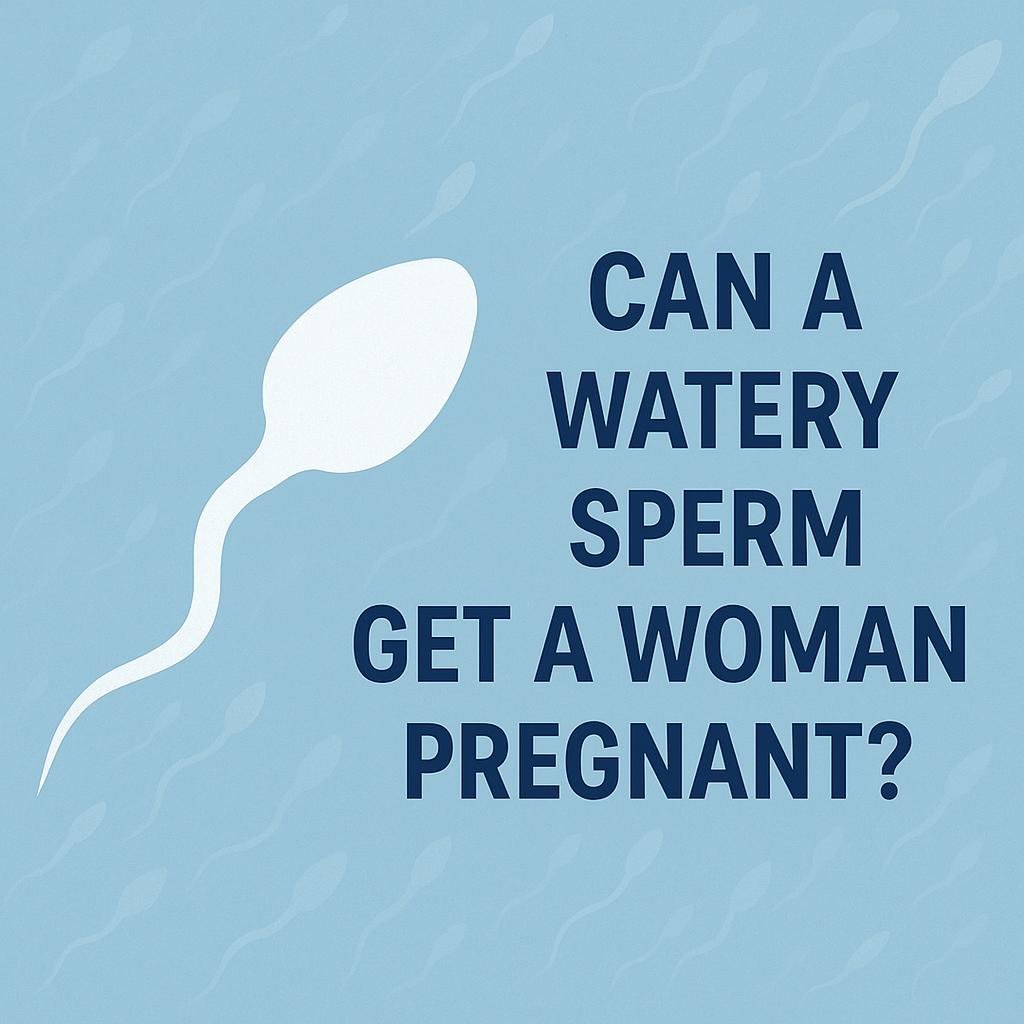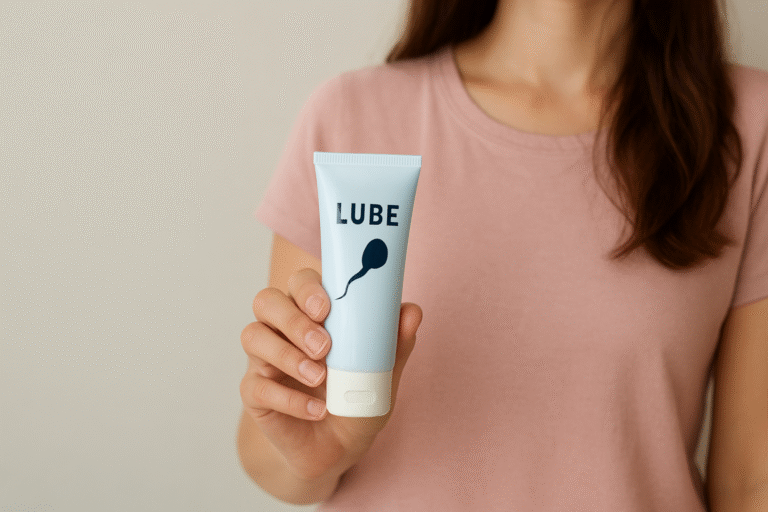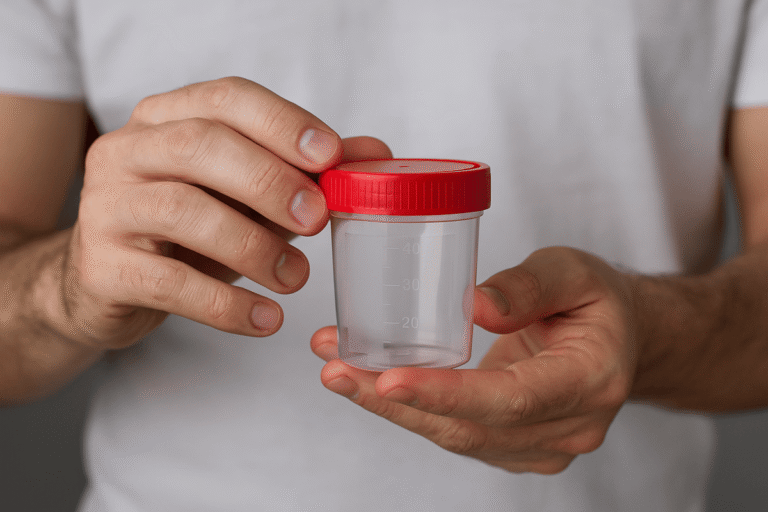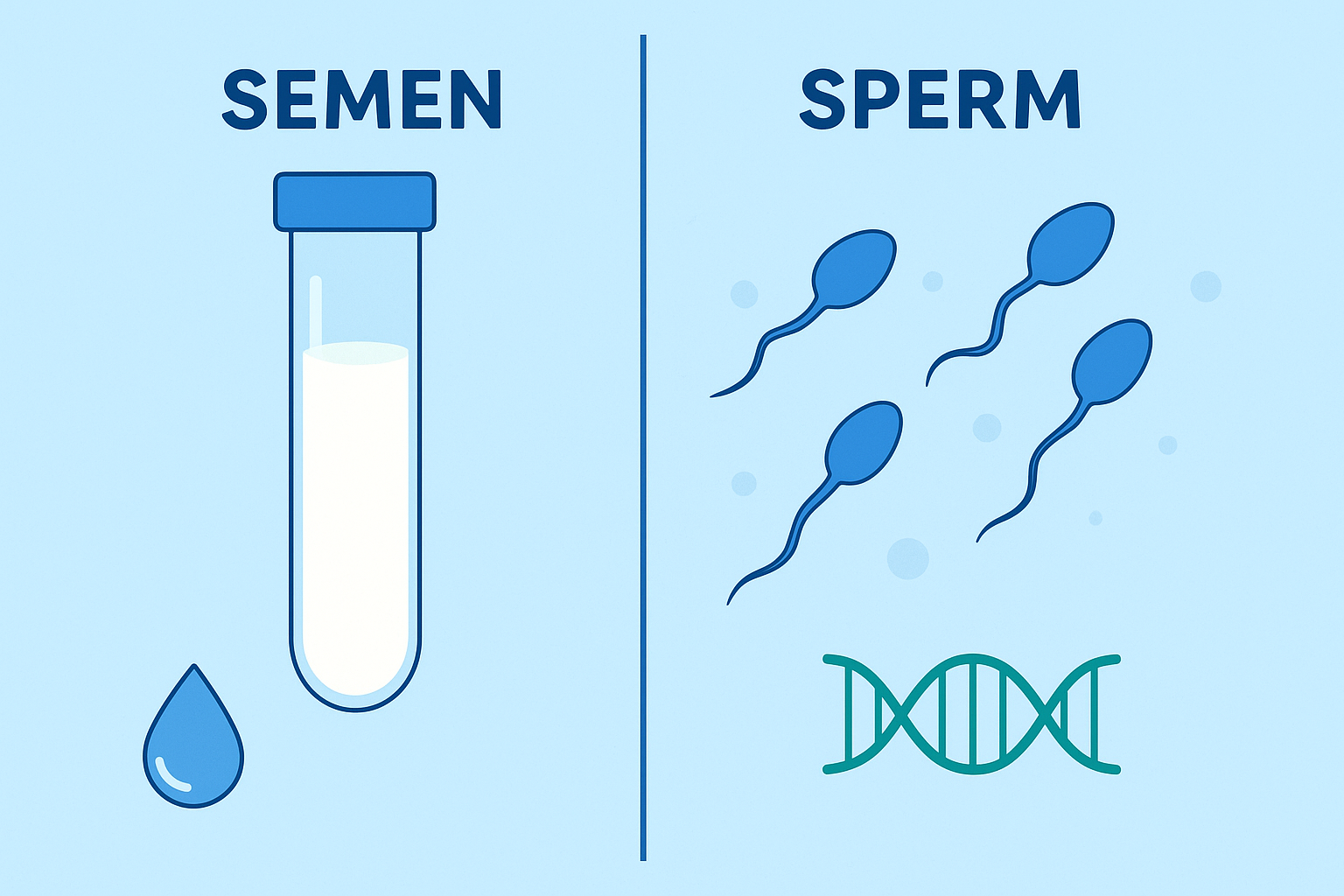When it comes to conception, there are numerous myths and misconceptions surrounding sperm quality and its role in fertility. One question that often arises is whether watery sperm can still result in pregnancy. Understanding sperm quality, including factors like consistency and motility, can offer insights into how conception occurs and what might influence your chances of getting pregnant. In this article, we will explore the topic of watery sperm, its effect on pregnancy, and whether sperm with this consistency can fertilize an egg. We will also discuss the importance of sperm health in general and the factors that affect fertility.
Also read: Is Peeing After Sex Really Necessary?
What Is Watery Sperm?
Watery sperm, also known as “thin” or “diluted” sperm, is sperm that lacks the typical consistency or viscosity that is usually expected. Normal semen, when ejaculated, has a thick, gel-like texture that helps sperm swim more effectively and reach the egg. In contrast, watery sperm is thin, runny, and tends to be less sticky. The primary concern with watery sperm is whether it contains enough viable sperm to fertilize an egg.
Causes of Watery Sperm
There are several factors that can lead to watery sperm:
- Dehydration: When the body is dehydrated, it can affect the consistency of bodily fluids, including semen. Semen is mostly water, and insufficient hydration can lead to thinner, watery semen.
- Frequency of Ejaculation: If a man ejaculates frequently, especially within a short time period, his sperm count might decrease, and the semen may appear more watery. This is because the body may not have had enough time to produce a sufficient volume of sperm.
- Diet and Lifestyle: Poor diet, lack of essential nutrients, excessive alcohol consumption, smoking, and high stress levels can all negatively affect sperm quality, leading to thinner, watery sperm.
- Health Conditions: Certain medical conditions, such as infections, hormonal imbalances, or underlying health issues, can affect sperm production and the consistency of semen.
How Does Sperm Contribute to Pregnancy?
Sperm plays a crucial role in the process of fertilization. For pregnancy to occur, sperm must travel through the cervix, into the uterus, and eventually reach the fallopian tubes where it can fertilize an egg. The sperm must be healthy, with good motility (ability to swim), an appropriate count, and the right morphology (shape).
Here’s how sperm contributes to pregnancy:
- Sperm Count: A higher sperm count increases the chances of pregnancy because there are more sperm available to reach the egg.
- Motility: Healthy sperm must be able to swim effectively toward the egg. This is why motility is one of the most critical factors in determining fertility.
- Morphology: Sperm must have a proper shape to be able to penetrate the egg. Irregular sperm shapes can reduce the likelihood of successful fertilization.
The consistency of the sperm itself is less important than these factors. Even though watery sperm may seem less ideal, it could still contain sperm with adequate motility and morphology to fertilize an egg.
Can Watery Sperm Fertilize an Egg?
Yes, watery sperm can still fertilize an egg. While the consistency of sperm plays a role in its ability to swim, it doesn’t directly determine whether it can fertilize an egg. The key factors for fertilization are sperm count, motility, and morphology. If watery sperm has enough viable sperm with good motility, it can successfully reach the egg and cause fertilization.
Sperm Viability in Watery Semen
Watery semen often suggests a lower sperm count, but not necessarily that all the sperm are compromised. It’s possible that the sperm in watery semen still have good motility and the right shape to penetrate an egg. However, if the sperm count is very low, this can reduce the chances of successful fertilization, even if the sperm are otherwise healthy.
Signs That Your Girlfriend Isn’t Sexually Attracted to You
Before diving further into sperm quality, it’s worth discussing how sexual attraction plays a role in conception. If a woman is not sexually attracted to you, it may affect intimacy, which can, in turn, affect your chances of conception. There are several signs that your girlfriend may not be sexually attracted to you:
- Lack of Physical Affection: If she is no longer interested in initiating physical touch, kissing, or hugging, it may be a sign of a decline in sexual attraction.
- Avoiding Intimacy: If she frequently avoids intimate moments or makes excuses not to engage in sexual activity, it could be a sign that she is not sexually attracted.
- Lack of Compliments or Interest: When a partner is not showing interest or giving compliments about your appearance, it can be an indication of a lack of sexual attraction.
- Emotional Distance: A partner who seems emotionally distant or uninterested in emotional connection may also be less likely to be attracted to you sexually.
If you’re experiencing any of these signs, it’s important to communicate openly with your partner and address any concerns regarding intimacy.
Can a Woman Get Pregnant with Low Sperm Count or Watery Sperm?
When it comes to fertility, sperm count is one of the most critical factors. A low sperm count, regardless of sperm consistency, can reduce the chances of conception. However, it is not impossible to get pregnant with watery sperm or a lower sperm count.
How Low Sperm Count Affects Pregnancy
A low sperm count means there are fewer sperm available to reach the egg. This can reduce the chances of fertilization, but it doesn’t make pregnancy impossible. Many men with low sperm count or watery sperm have successfully fathered children. The chances of conception depend on the number of sperm and their motility.
Improving Sperm Quality
If you’re concerned about the consistency or quality of your sperm, there are ways to improve sperm health:
- Stay Hydrated: Drinking plenty of water helps maintain the proper consistency of semen.
- Eat a Balanced Diet: A diet rich in vitamins and minerals, especially zinc and folate, supports healthy sperm production.
- Exercise Regularly: Physical activity boosts overall health, including sperm quality.
- Avoid Harmful Habits: Reducing alcohol consumption, quitting smoking, and managing stress can significantly improve sperm quality.
- Medical Treatments: If sperm count is severely low, medical treatments, such as sperm retrieval or hormone therapy, might be necessary.
When to Seek Medical Help for Fertility Issues
If you are concerned about the quality of your sperm or your ability to conceive, it’s important to seek medical advice. A fertility specialist can perform tests to determine your sperm count, motility, and overall reproductive health.
Some signs that it may be time to seek medical help include:
- Inability to Conceive After One Year of Trying: If you and your partner have been trying to conceive for over a year without success, it may be time to consult a doctor.
- Pain or Discomfort: If you experience pain in the testes or difficulty with ejaculation, these could be signs of an underlying issue that affects fertility.
- Unexplained Low Sperm Count: If semen analysis shows consistently low sperm count or watery sperm, medical intervention may be necessary to improve sperm quality.
Conclusion
In conclusion, while watery sperm may seem concerning, it doesn’t necessarily mean that conception is impossible. As long as the sperm present in the semen are viable, with good motility and the correct morphology, they have the potential to fertilize an egg. However, if watery sperm is accompanied by other signs of low sperm count or infertility, it’s important to consider lifestyle changes and seek medical help if necessary.
Understanding sperm quality, hydration, and overall health is crucial when it comes to fertility. Both partners play an important role in conception, and addressing any fertility concerns through lifestyle changes or medical assistance can increase the chances of a successful pregnancy.
FAQs
Can watery sperm still result in pregnancy?
Yes, watery sperm can still result in pregnancy if the sperm within it are healthy, have good motility, and are of the correct morphology. The consistency of the sperm doesn’t directly prevent pregnancy.
What does watery sperm indicate?
Watery sperm may indicate a low sperm count, dehydration, or frequent ejaculation. However, it doesn’t automatically mean the sperm is unhealthy or infertile.
How can I improve sperm quality for conception?
You can improve sperm quality by staying hydrated, eating a balanced diet, exercising regularly, and avoiding harmful habits like smoking and excessive alcohol consumption.
What are the chances of pregnancy with low sperm count?
Although a low sperm count reduces the chances of conception, it doesn’t make pregnancy impossible. Many men with low sperm count have successfully fathered children.





[…] Also Read: Role Of Watery Sperm In Pregnancy […]
[…] Also read: Can Low-Volume Sperm Lead to Pregnancy? […]